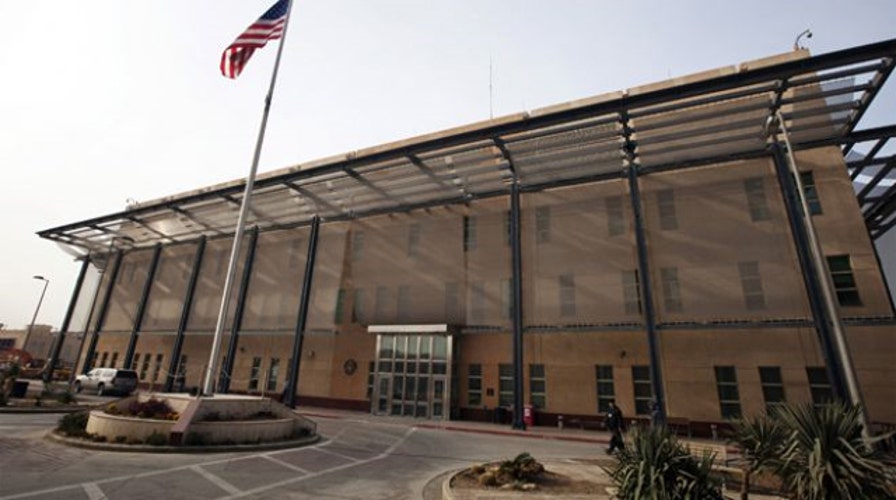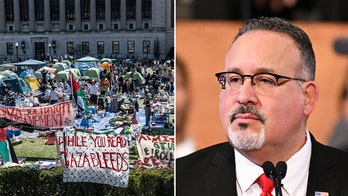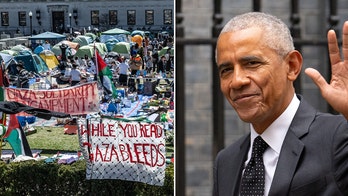Panel discussion: U.S. closes embassies due to terror threat
What does this mean for U.S. foreign policy?
National Security Adviser Susan Rice is playing a driving role in the decision to shutter U.S. embassies and consulates over a major terror threat, sources tell Fox News, claiming the former diplomat is trying to avoid a repeat of the deadly Benghazi terror attack nearly a year ago.
Twenty-two U.S. posts were closed over the weekend, and the State Department announced it will keep 19 embassies and consulates closed through Saturday "out of an abundance of caution."
Lawmakers are describing the threat as among the most serious they've seen in years.
Sources tell Fox News that it comes as Al Qaeda leader Ayman al-Zawahiri demands that key leaders of Al Qaeda in the Arabian Peninsula step up their activities in the wake of recent killings of top terrorists.
Daily politics news delivered to your inbox: sign up for our newsletter
One Middle East diplomat tells Fox News that al-Zawahiri has been "pressuring" AQAP, and that the pressure that local Al Qaeda figures have been subjected to -- aimed at getting them to launch new terrorist attacks on Western and American targets -- is "unprecedented." This is what has led to the extraordinary volume of "chatter" picked up by U.S. intelligence following a period of months of "absolute quietness" on terrorist phone lines, computer outlets, websites and other channels.
Sources say that Rice has been a driving force in the United States' response to this threat. She led a meeting on Saturday on the threat with top officials, including Secretary of State John Kerry and Director of National Intelligence James Clapper.
The former ambassador to the United Nations is still stung over perceptions of her role in the aftermath of the Benghazi terror attacks last September. She came under heavy and sustained criticism for initially describing the attacks as an out-of-control protest in reaction to an anti-Islam film -- which drove less-violent protests in other cities in the region at the time. The administration later confirmed, though, that there was no protest on the ground in Benghazi before the attack in which four Americans were killed.
Concerns about Rice's role helped scuttle her consideration for the Secretary of State post, which requires Senate confirmation. She was later appointed as national security adviser.
Aside from the controversy over Rice's description of the attack, the administration has continued to face questions about whether the embassies in such volatile parts of the world are adequately secured.
Congress is still dealing with embassy security funding in a pending budget, as officials try to react to intelligence about the emerging terrorist threat.
Sources tell Fox News that the U.S. moves were also prompted by a spate of recent Al Qaeda-led prison breaks, including a recent one in Aleppo, Syria, that have freed hundreds of Al Qaeda operatives over the last month. The return of these individuals to their respective "battlefields" may have contributed to the escalation in "chatter" and has heightened American alarm over the plotting. Recent prison breaks have been orchestrated in Afghanistan, Iraq, Libya and Pakistan.
Yemen is said to be cooperating closely with U.S. intelligence in this period, and the data shared by Sanaa is said to have informed the embassy closures.
Maryland Rep. C.A. Dutch Ruppersberger, the top Democrat on the House Intelligence Committee, also said the intercepted threats came from "high-level people" in Al Qaeda in the Arabian Peninsula.
He told ABC's "This Week" the information was about a "major attack."
Yemen is home to Al Qaeda's most dangerous affiliate, blamed for several notable terrorist plots on the United States. They include the foiled Christmas Day 2009 effort to bomb an airliner over Detroit and the explosives-laden parcels intercepted the following year aboard cargo flights.
New York Republican Rep. Pete King, who leads the House Homeland Security subcommittee on counterterrorism and intelligence, said the threat included dates but not locations of possible attacks.
"The threat was specific as to how enormous it was going to be and also that certain dates were given," he said on ABC.
The administration's announcements Friday said the Al Qaeda network might target either U.S. government or private American interests.
Fox News' James Rosen and The Associated Press contributed to this report.





